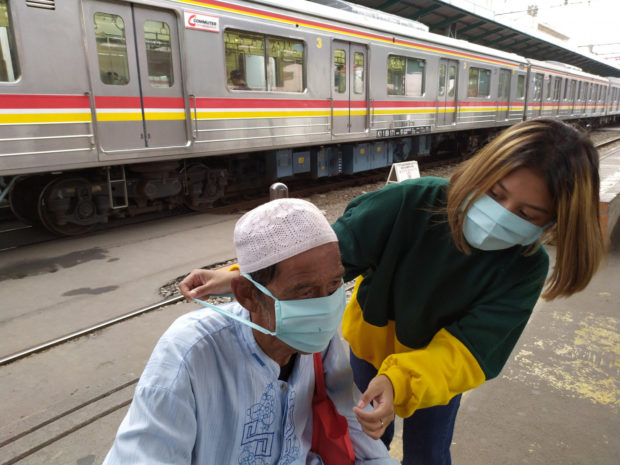Indonesians surprised at other countries being better prepared for pandemic—survey

A woman helps an old man wear a face mask while he waits for the commuter train at Manggarai Station in South Jakarta on April 5. The Jakarta Post/Asia News Network/P.J. Leo
JAKARTA — Indonesians are “fairly satisfied” with their country’s response to the coronavirus pandemic, yet they are the most “surprised” at how other countries are better prepared to face the global health crisis, a global survey has found.
The survey, conducted by Singapore’s social research agency Blackbox Research and digital market research company Toluna from April 3 to April 19, gives Indonesia a relatively high index score of 48 points — slightly above the global average of 45 points — in COVID-19 crisis performance.
The score ranks Indonesia ninth globally and seventh within the Asian region. The survey was carried out online and involved more than 12,500 respondents aged 18 to 80 across 23 countries.
Only 1 in 5 Indonesians, or 20 percent, said they were “angry and frustrated” as the world went through the coronavirus crisis. However, Indonesians top the list as being the most surprised at how much better prepared other nations were in tackling the pandemic, with 70 percent expressing such a view.
Blackbox Research founder and CEO David Black said the sentiment was a result of Indonesian authorities’ slow response during the early stages of the pandemic as well as the country’s limited testing capabilities compared to its Southeast Asian counterparts.
Article continues after this advertisement“With neighboring countries like Singapore and Malaysia starting to identify cases as early as January, we can see why Indonesians are reflecting on how quickly other countries kicked into gear with the pandemic, as compared to Indonesia, which only took action in early March,” David said in a statement made available to The Jakarta Post on Wednesday.
Article continues after this advertisementIndonesia, which now has recorded more than 15,000 coronavirus cases and more than 1,000 fatalities, reported its first two cases on March 2.
China comes out on top with a score of 85, as most of its citizens rated the country’s performance “favorably”, followed by Vietnam with a score of 77 and the United Arab Emirates (UAE) and India, both scoring 59 in the index.
The survey noted that New Zealand with 56 points was the only Western nation with an index score above the global average, showing that “citizens in Western countries are generally less satisfied with their countries’ performances.”
Japan ranks last in the survey, with an index score of 16 due to its perceived poor political performance and business leadership, among other things, according to Blackbox Research’s poll.
On the other hand, only seven of the 23 countries’ political leaders were rated highly for their coronavirus crisis response by at least 50 percent of their respective citizens. For Indonesia, the percentage stood at 37 percent, or below the global average of 40 percent.
Most Indonesians were also dissatisfied with businesses performances during the pandemic, as only 29 percent of them felt business leaders had responded favorably to the health crisis, which is slightly above the global average of 28 percent.
“Economies all around the world have been dealt a huge blow from COVID-19, and Indonesia, as Southeast Asia’s largest economy, has seen the halting of businesses and reported its weakest pace since 2001,” Black said.
“While the Indonesian government has taken decisive measures to cushion the impact of COVID-19, the expectations of a looming recession and workers hard hit by layoffs and forced unpaid leave have led to the general sentiment that business leaders are not stepping up to the crisis.”
He underlined that COVID-19 was not the first and might not be the last global pandemic and therefore leaders had to consider the lasting implications of the crisis in order to emerge from it “stronger and more resilient”.
Three things people most want to see once the current crisis is over were a full economic recovery in six months, healthcare reforms and better use of technology for contract-tracing, Black added.
For more news about the novel coronavirus click here.
What you need to know about Coronavirus.
For more information on COVID-19, call the DOH Hotline: (02) 86517800 local 1149/1150.
The Inquirer Foundation supports our healthcare frontliners and is still accepting cash donations to be deposited at Banco de Oro (BDO) current account #007960018860 or donate through PayMaya using this link.